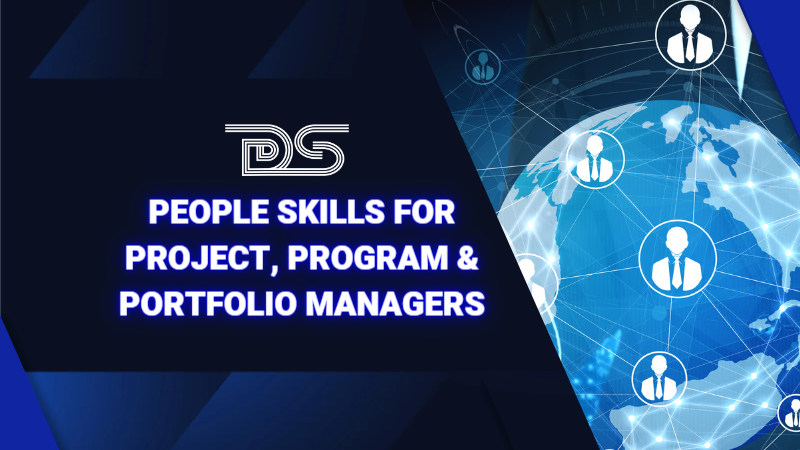
People Skills for Project, Program & Portfolio Managers
What makes a successful Project/Program/Portfolio Manager? Is it the number of years of experience? Technical know-how? Or the one who is good at managing people?
Creating objectives, critical path analysis, work breakdown structures, resource scheduling, and risk management are just a few of the technical areas of project management that project managers usually get training in. However, understanding pertinent people and management issues is important to a project’s success. In addition, a project manager must also continually deal with clients and other stakeholders. As a result, project managers’ people skills, also known as soft skills, are becoming increasingly important.
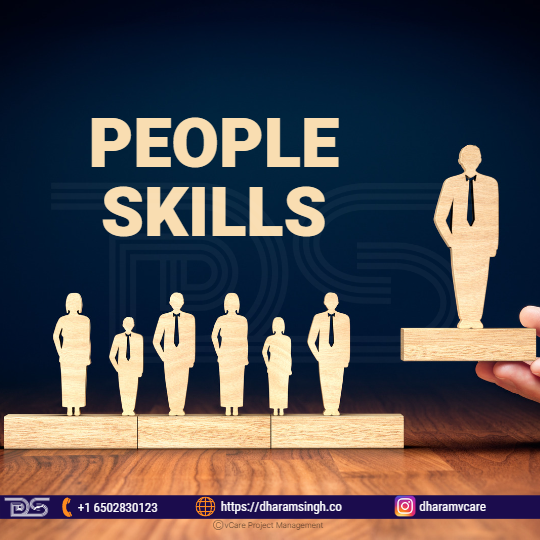
People Skills
People skills
People skills are linked with behavioral patterns or behavioral interactions that assist one in communicating effectively with people. Project leaders with strong people skills may favorably influence others, socialize effortlessly, and overcome public anxiety.
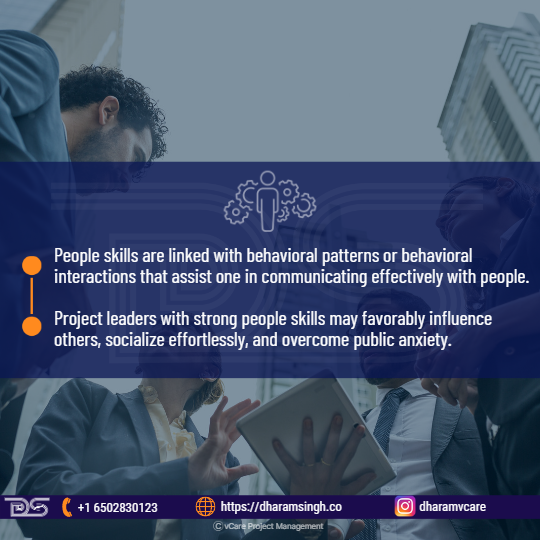
Project Leaders With Strong People Skills
They are transferrable social abilities that allow one to collaborate well with others. The three main types are personal, interaction, and interpersonal skills. These categories achieve the same overall objective: making the working connections with others mutually satisfying, pleasant, and productive.
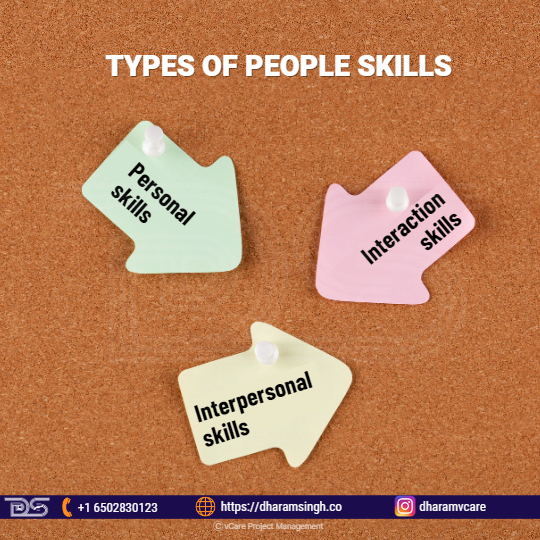
Types Of People Skills
Types of People Skills
- Personal skills: These include the capacity to communicate your skills and exhibit yourself to others successfully. It comprises characteristics such as self-assurance, honesty, and aggressiveness. Furthermore, one must be able to recognize their limitations and make sound judgments based on logic rather than emotion.
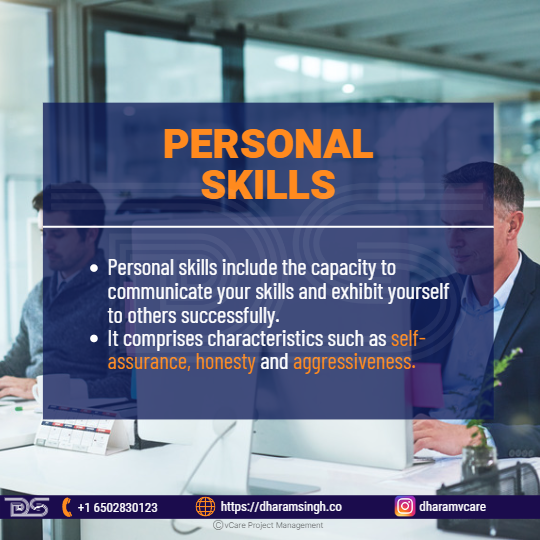
Personal Skills
- Interaction skills: It is essential for understanding the behavior and ideas of others while preserving limits and creating connections. A project manager, for example, should have social etiquettes that need empathy and listening skills to know that you have listened to them and given respect for their limits and requirements to connect with co-workers and clients productively.
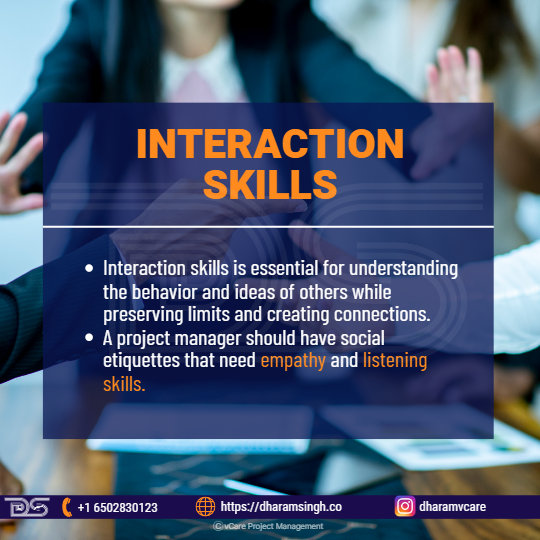
Interaction Skills
- Interpersonal skills: These are related to intercession skills, but they apply mainly to situations in which the persons involved have opposing interests or viewpoints.
Contrary to popular belief, people skills are not subjective concepts. On the contrary, these skills are critical, particularly in the project management role, which is largely concerned with people.
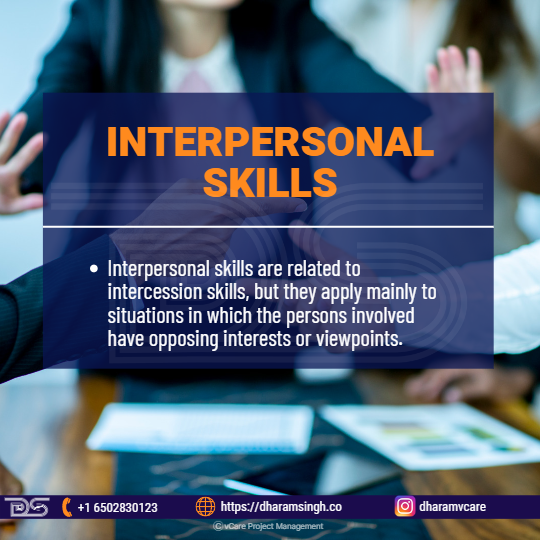
Interpersonal Skills
Project management is more than just completing the project; it is also about how you lead and assist your team. Leading others and leading them through the whole project lifecycle entails a certain amount of responsibility and necessitates certain abilities.
Furthermore, as work evolves, businesses embrace a varied workforce. As a result, people skills are essential for embracing tolerance and diversity. In short, good project management is based on human communication and connection.
Essential People Skills for Project/Program/Portfolio Managers
A successful project professional must possess a wide range of skills. Those that come to mind first are the technical skills required to create a project plan, schedule, budget, and all relevant paperwork. One must also have the conceptual skills to “see” the project as it develops.
However, such talents will only assure project success if the project manager can supplement their technical skills with a wide range of interpersonal skills or people skills. Here are some of the essential people skills for Project/Program/Portfolio Managers:
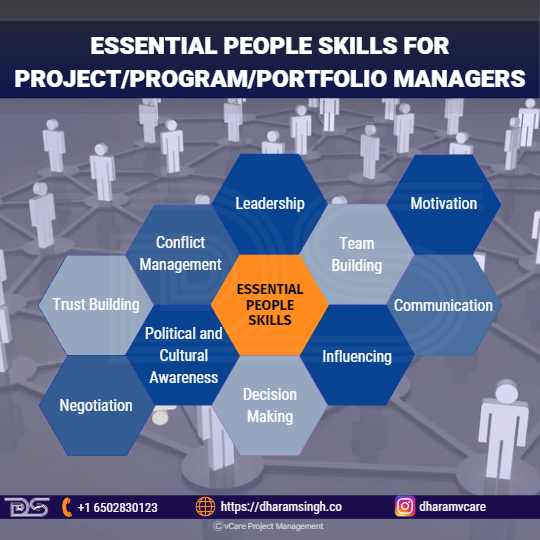
Essential People Skills for Project/Program/Portfolio Managers
- Leadership
One of the crucial skills a successful project manager has to have is leadership. This skill is essential because the project manager frequently has little control over the team members involved. This aspect calls for leadership on their part to handle the project. Although managing via leadership rather than authority might be more challenging, it is typically more effective since it is based on respect and trust.
At the start of a project, a leader must establish their vision and express it to the team. It makes supporting the project’s objectives easier for everyone on the team. Effective leadership will also keep the team members inspired and motivated to perform at their highest level.
- Team Building
Another vital skill for a competent project manager is team building. Because of the nature of projects, personnel from diverse departments are engaged. Most employees might have never worked together and may not even be familiar with one other’s departments. If the project manager can unite these individuals into a cohesive team with the same goal, the project may stay within its objectives.
Although some of the project’s individuals or sub-teams may execute their jobs individually, they must feel like they are part of the overall team. When choosing their part of the project, they must consider what is best for the project, not simply what is best for them and their departmental problem. A sense of belonging to a team that solves an issue for the entire company (rather than playing departmental favoritism) may go a long way.
Creating a team in which each member feels comfortable reaching out to the others will also guarantee that minor problems do not escalate into major concerns later in the project. It is consequently critical that project managers not only understand the duties and procedures involved in team building but also have the skill and finesse to apply them correctly.
- Motivation
If you want your project to succeed, you should concentrate on improving your motivating skills. Having these qualities will assist your project team members to stay interested in the project, strive for excellence, and work toward a common objective.
Good motivating skills will enable a project leader to create an environment where team members can fulfill project objectives while being satisfied with their work.
- Communication
Most professions require excellent communication skills. Some project managers believe the communication part of project management to be their primary job obligation.
Excellent communication skills are essential for building relationships among project team members, establishing trust, and keeping everyone motivated and on track.
A project involves several stakeholders informed of its status, timeframes, progress, risks, and concerns. A skilled project leader must convey all of these facts to project stakeholders on time and in the manner they anticipate. Project managers must also interact effectively with top management within their business.
Giving the interested stakeholders too much or not enough information might prevent the project from reaching its full potential.
- Influencing
It is critical to be able to influence people if you want to be a successful project manager. But what is important is understanding when and how to utilize such skills and avoid becoming a manipulator. There is a narrow path to follow.
A project manager’s responsibility is to bring employees from disparate departments together and get them to work together toward a similar objective. Sometimes, getting these diverse people to comprehend and agree on the specifics of achieving that goal might not be easy. A skilled project leader will utilize their skills to persuade others and assist them in reaching an agreement.
So, think about your relationship and influence over people not just for the time of the project but also for how things will proceed long after the project is complete. After the project, customers and end-users will utilize the goods, deliverables, and outcomes developed by the project. A powerful and positive effect creates a trusting atmosphere among all team members during and even after the project.
- Decision Making
A successful project manager must acquire various talents, one of which is decision-making skills. There are four primary decision-making styles: Directive, Analytical, Conceptual, and Behavioral. Project managers should be conversant with all four since either has to be leveraged at some time. In addition, consultation, consensus, command, and random styles are provided.
Having a decision-making model will facilitate this process. In addition, since so many people who may disagree with a decision are involved in the project, having a process to follow can be very helpful in gaining consensus with the group.
- Political and Cultural Awareness
In today’s world, project managers work in a more globalized context than in the past. As a result, cultural diversity is another critical component of effectively navigating the corporate world as a project leader. A successful project manager must be able to notice and comprehend cultural differences and incorporate them into the project plan.
Cultural differences can impact decision-making and the pace with which work is performed. It can also lead to members acting without sufficient forethought. Recognizing cultural differences can lead to conflict and stress within the project, further delaying it.
Furthermore, it is critical to understand the politics at work in the project environment. The use of political skills can greatly aid a project manager’s success. More significantly, failing to recognize the politics involved can lead to substantial challenges and impediments that can cause a project to be delayed or even destroyed.
- Negotiation
The nature of a project manager’s work necessitates being skilled negotiators. Typically, several stakeholders are involved in the project, and most projects include team members from many departments. This aspect frequently leads to a variety of points of view, which can make it challenging to keep the project on track and within the intended scope.
Negotiation skills can assist a project manager in obtaining an agreement or making a compromise on an issue that may be causing difficulty or delay.
There are several negotiation skills that the project leader should be able to employ. These include assessing each scenario, being an engaged listener, and communicating coherently throughout the dialogue. It can be important to distinguish between the wants and requirements of the people concerned. Another critical focus is recognizing the distinction between people’s perspectives and their interests and concerns directly relevant to the project.
- Trust Building
When collaborating on a project, trust is really valuable. A trusting environment promotes effective relationships and communication among team members and stakeholders. Therefore, a project leader wants to foster an atmosphere of mutual trust. This trust helps to maintain morale, keep conflict at a minimum, and keep everyone working effectively together.
If you were working on a project, you would want everyone participating and working hard to see it through to completion. When you work hard, you expect that others are also working hard to achieve the project objectives. The team leader wants to trust a team member who suggests they can execute a task properly and on time. If someone in the team wants assistance, they want a team that will support and collaborate to achieve the work. So don’t waste time second-guessing someone who isn’t telling the truth or has bad motives.
There are several approaches for a project manager to establish trust. First, a project leader must be a great and open communicator to reduce misunderstandings and build confidence among team members. Often, one may have to put their self-interests aside for the team’s sake and must model and display the behavior they demand from others.
- Conflict Management
On a project, conflict is almost unavoidable. Members of the project team and stakeholders may have differing perspectives, areas of expertise, interests, personalities, work styles, and so on. When one adds additional factors to the mix, such as tight deadlines, resource limits, and communication challenges, it’s easy to understand how conflict might arise.
Conflict often leads to a better solution to a problem. For example, if a team member would prefer to agree or accept the status quo, then risk causing conflict by pointing out a problem, asking a question, or suggesting an improvement. In that case, it is simpler to accept a suboptimal solution. However, disagreement frequently stops the team from working successfully together and diverts attention away from the duties at hand.
The goal is to prevent conflict or its escalation or to know how to regulate or lessen it when it arises if they cannot avoid it. For example, a project manager may use several tactics or methods when dealing with a dispute. They can be aggressive, accommodating, avoiding, or compromising. Some approaches work better in particular situations than others.
The project manager and team members involved in the conflict influence the team’s efficacy. A project manager can also utilize many approaches; if one fails, they may have to try another to see if it is more successful.
Why are people skills important?
People skills are crucial because it is much more difficult for people in an organization to work together to achieve common goals if they fail to express themselves or understand how their co-workers feel about a certain project, task, or difficulty.
As a result, the organization’s production and profitability suffer while creativity and innovation endure. People skills, in particular, may assist us in the following:
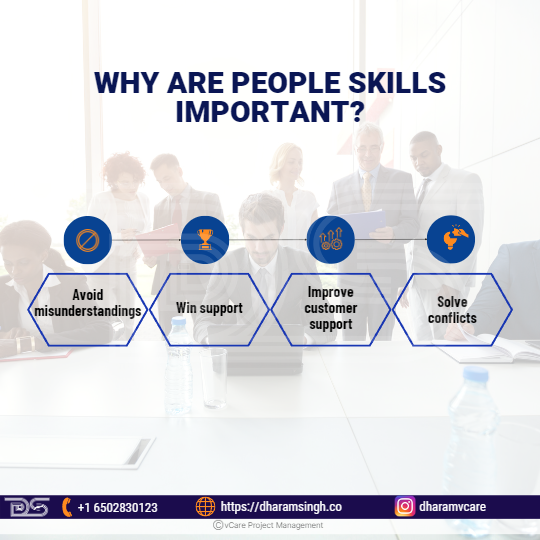
Why Are People Skills Important?
- Avoid misunderstandings: People are less likely to misinterpret what you’re saying if you communicate ideas and instructions.
- Win support: If you can communicate effectively and understand what your team wants to hear, it will be much simpler to persuade them and get them “on board.”
- Improve customer support: You’ll be better positioned to fix their difficulties if you can get inside their minds and comprehend their key problems.
- Solve conflicts: Conflict isn’t always unpleasant, but if it goes unresolved, it can harm morale and productivity. Strong people skills allow us to see things from a new perspective and identify similarities, which reduces the likelihood of significant conflicts.
How to develop people skills?
Even while people skills are critical, they are frequently undervalued by employers when it comes to job advancement. Internal training sessions are frequently centered on teaching hard skills, such as completing a given activity or utilizing a specific piece of software. These methods make it more difficult for professionals to build their interpersonal skills.
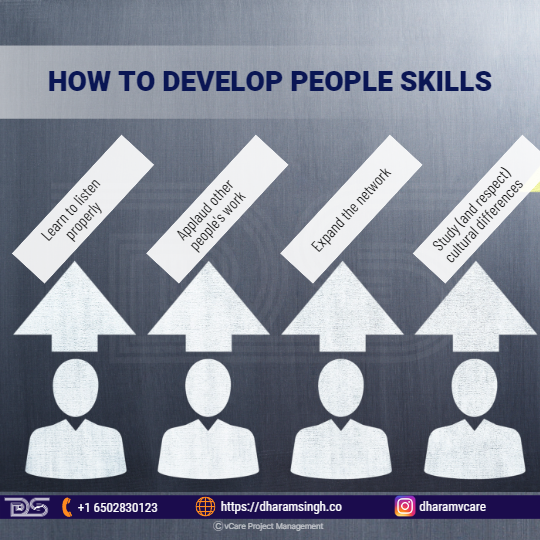
How To Develop People Skills?
But just because something is more difficult does not make it impossible. Here are four suggestions for improving people skills and becoming a more attractive prospect are:
- Learn to listen properly
- Applaud other people’s work
- Expand the network
- Study (and respect) cultural differences
Final Thoughts
Effective project management is challenging but having people skills may help project leaders run projects more efficiently and with less stress. Furthermore, it enables building a team that can handle the most challenging tasks and is more successful and resilient during difficult times.
People skills, on their own, will not keep a project team motivated and engaged. However, arming oneself with the necessary technical skills and intelligent tools may dramatically enhance the workflow and contribute to the project’s success.
Feel free to check out my discussion on this topic with Thomas Walenta in YouTube
For any questions related to your Project Management career, training, and certifications, you can book an obligation free 15 minutes session with me by visiting http://talktodharam.com/
You can subscribe to the vCare Project Management YouTube Channel to catch future videos of our Q&A series and certification success stories: https://bit.ly/2YF0wJl
You can subscribe to and follow my podcasts and interviews with Project Management Experts on YouTube at https://bit.ly/2NDY8wd


Recent Comments